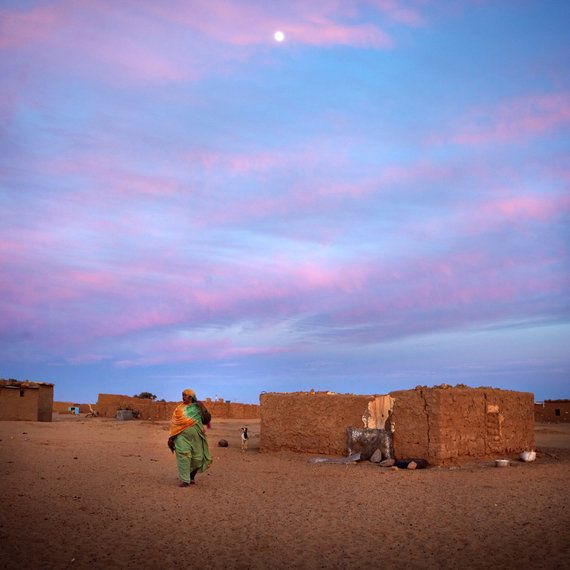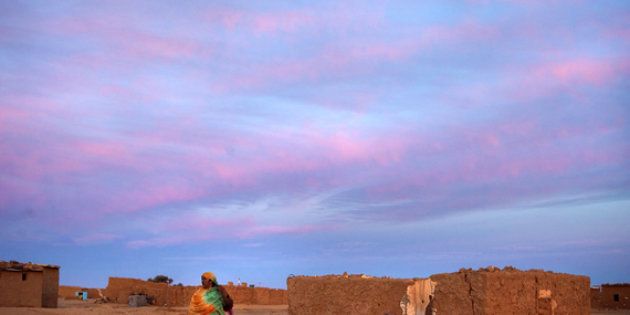
Many of us have heard about the Saharawi refugees, especially in Spain, but few of us know about their harsh reality.
They are basically nomadic tribes, Berbers from the Sahara desert mixed with Arabs, who have their own language, Hassania, and their own culture.
They settled on the Atlantic coast of Africa for many years, between Morocco and Mauritania, and were colonized by Spain in accordance with the Berlin Conference of 1884.
In 1975, under pressure from USA and France in order to safeguard “a good relationship with Morocco”, and driven by obvious economic and political interests, Spain abandoned the Saharawi people and their territories, leaving them alone to fight for their rights.
Faced with the Moroccan occupation, the Saharawis armed themselves and fought until the signing of the UN Peace Plan in 1991, which recognised the right to self-determination of Western Sahara through a referendum. The referendum has not yet taken place. In short, more than 35 years waiting for a solution, more than 20 years since the UN Peace Plan.
A real taboo subject.
Algeria gave them some 150km of desert far from the coast of Western Sahara to help keep the Saharawis together, who built refugee camps where they have chosen to live in order not to lose their identity and their culture, hoping that one day they will return to their homes in their own land. They survive mainly from humanitarian aid and their many dreams.
It is strikingly incredible that in a world that advocates democracy, this situation continues and that we as people who share this world allow the suffering of the sisters and brothers of this fellow people. A blatant case of injustice.
Every year the film community and Saharawi activists from Spain gather in the Dakhla refugee camp to celebrate a film festival, for the enjoyment of its people, showing films to send a message to the whole world that this fraternal people are not forgotten, while giving them a halo of hope and some entertainment and fun.
This year about 250 people sympathetic to the Saharawi cause travelled from Spain, by plane to Tindouf and by 4-hour caravan across the desert to the refugee camp in Dakhla.
The visitors were divided into different groups and were welcomed by families characterized by a great hospitality. They tasted their traditional meals and slept in their humble tents, which made for a unique experience. During the day, all kinds of social activities are carried out, such as clown performances in the schools, visits to the precarious hospital and its small greenhouse garden, dances and traditional parades to get to know this people better, their origins and the reason for their struggle.
The group of actors and guests agreed on a statement, which was later written by the actor Juan Diego Botto and read at the festival’s closing gala by the actor Eduard Fernández. It reads as follows:
We, the guests of the ninth edition of the International Sahara Film Festival, after having lived for a week with different families of the Dakhla refugee camp, have decided to present this text to civil society. We know that there are hundreds of statements and manifestos written for this cause over the years. We know that many people believe that words are empty shells blown away by the wind and that these manifestos are toasts to the sun destined to go nowhere.
We know that not a few people believe that this is a lost cause. But we think differently. We have learned from the Saharawis that dignity knows no deadlines and that the peaceful struggle of this people to return to their land will not cease until they are given back what is rightfully theirs.
We have learned from the Arab revolts that words are the keys to the engine of human will and that the desire of a group of people can overthrow regimes that seemed to last forever.
We have learned that the lives of nations are longer than that of the dictators who oppress them. That is why, if it is necessary to repeat everything again, we will repeat it once, or twice, or a hundred, or a thousand, or whatever is necessary to take hold of the will of civil society and move this mountain that we know is not and cannot be eternal.
After Spain left its colony in Western Sahara, this country suffered the occupation of Morocco in the face of Spain’s lacerating passivity. The occupation brought violent repression under which there was a desire for genocide. This led to a war between the Saharawi people and Morocco. This war lasted for 16 years and ended with the signing of an agreement between the parties sponsored by the USA and the United Nations.
In this agreement, Morocco committed itself to holding a referendum in which the inhabitants of Western Sahara would decide on their future. Not only has this referendum not taken place, but the inhabitants of the occupied Sahara suffer daily denial of their identity, repression, imprisonment and countless tortures for fighting for their country’s independence.
Imprisonment, beatings, rape and disappearances are, unfortunately, common practice. Moreover, the exiles of that occupation have been living in refugee camps in very difficult conditions for 37 years.
We are not going to address the Spanish rulers who, whatever their colour, have supported the Sahrawis while in opposition and have abandoned them when they came to government. Nor to those responsible for MINURSO, the UN delegation for the referendum which has shown a criminal passivity in the face of constant human rights abuses, nor to the French government which insists on vetoing time and time again any form of pressure on Morocco, not to fulfil its commitments, but even to abandon the systematic torture and repression of this people.
However, we address the Spanish, French and international civil society to put pressure on their governments and institutions to resolve this indignity which has gone on for too long.
The referendum in Western Sahara must be held once and for all. The UN must assume responsibility for the enforcement of human rights in the occupied territories before the next death is the fuse that forces the Saharawis to take a path, that of violence, which they themselves do not want.
The Spanish Government must assume its obligations as a decolonizing state and place the defense of human rights above any other economic interest. We know that governments will move nothing if they are not forced by their citizens, and that is why we are addressing them, so that stone by stone, word by word, gesture by gesture, they will join our voice in this demand, in this demand that cannot be postponed. Because we know that the only struggle that is lost is the one that is abandoned.
This photograph was taken after a shocking sunset just before nightfall, on the eve of a full moon night. That day the temperature reached 35ºC -spring for them (imagine the heat of summer)- and was partially cloudy, which helped to create a spectacular range of colours in the sky. The woman is a typical Saharan woman, dressed in traditional clothes and who comes from enclosing the goats in the stable.
If you look at the left side of the house you can see that one of the youngest goats has escaped and is half hidden watching the intruder. And if you look a little closer you will see the floor covered with “poop” from the herd.
The reason why the photograph is called “La Tata” is because she was the mother of our family and among those who formed our group were three musicians who came to give a concert at the closing gala of the festival. Er Canijo de Jerez, Juanito Makandé and Tomasito de Jerez composed a song for her entitled “I am The Tata”




